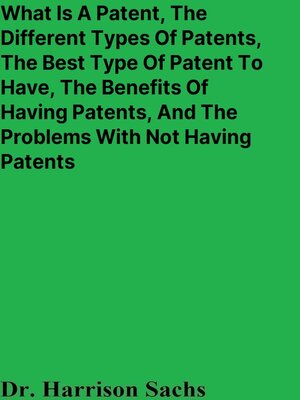What Is a Patent, the Different Types of Patents, the Best Type of Patent to Have, the Benefits of Having Patents, and the Problems With Not Having Patents For Products
ebook
By Dr. Harrison Sachs

Sign up to save your library
With an OverDrive account, you can save your favorite libraries for at-a-glance information about availability. Find out more about OverDrive accounts.
Find this title in Libby, the library reading app by OverDrive.



Search for a digital library with this title
Title found at these libraries:
| Library Name | Distance |
|---|---|
| Loading... |
This essay sheds light on what is a patent, demystifies the different types of patents that people can have, reveals the best type of patent to have, delineates the benefits of having patents, and elucidates the problems with not having patents for products. Succinctly stated, a patent refers to a document which is able to confer a property right to an inventor or entity. In exchange for relinquishing "a comprehensive disclosure of the invention" the inventor or entity is able to receive an "exclusive rights to the patented process, design, or invention for a designated period" of time. The protections provided by being issued a patent can be deemed "a form of incorporeal rights". As of 2022, it is estimated that significantly over 15,900,000 have been issued around the world. The duration that the patent confers exclusive rights to the inventor can vary depending upon the type of patent that was issued and can vary depending upon the jurisdiction that it was issued in. Utility patents and plant patents for instance confer exclusive rights to the inventor for twenty years. Design patents for instance confer exclusive rights to the inventor for fourteen to fifteen years. The jurisdictions that patents provide exclusive rights to the inventor in are based on the the jurisdictions that the patents were issued in. Being able to be issued a patent for devising "new process, new design, or new invention" encourages inventors and entities to invest in bringing their innovative inventions to the market. It is incumbent for inventors and entities to be able to bring their innovative inventions to the market since innovative products are able to enrich peoples' lives in contexts in which they assuage unmet needs. Inventors are on the forefront of innovation and can help to augment the standard of living by ushering in new innovative inventions to the market that help to ameliorate peoples' lives. The issuance of a patent is not solely limited to being issued to inventors. Patents can also be issued to entities, such as companies. If a company has patents and has worthwhile innovative products that are able to enrich peoples' lives by assuaging unmet needs among its target market then it is easier for them to draw forth enormous sales volume, sales revenue, and profits, especially if its competitors cannot produce substantially similar innovative products for an extended period of time. Company should leverage potent marketing activities to raise product awareness of its innovative products. If a company has patents and has worthwhile innovative products that are able to enrich peoples' lives by assuaging unmet needs of its target market then it is easier for them to cultivate market share in a new product market. Companies should should not only aim to develop products that assuage the unmet needs of their target markets, but that also are deemed to be so innovative and novel that they are able to elicit new product categories and new niche product markets post being released..If a company has patents then it is able to minimize competitive risks, especially if it deemed to be the only competitor in an emerging niche product market due to their patents preempting other companies from developing substantially similar innovative products for an extended period of time. If a company has patents then it is able to more easily attain market dominance in a new niche product market that it has brought to fruition by releasing new innovative products that other companies are unable to develop substantially similar innovative products to for an extended period of time. Being able to be issued a patent encourages innovation and strategic risk taking. Companies prefer to be able to be a sole...







